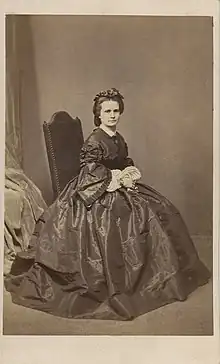Henrietta Dugdale
Henrietta Augusta Dugdale (née Worrell; 14 May 1827 – 17 June 1918) was a pioneer Australian who initiated the first female suffrage society in Australia. Non-conformist, provocative and quick-witted, her campaigning resulted in breakthroughs for women's rights in Australia.
Henrietta Dugdale | |
|---|---|
 Henrietta Dugdale c. 1845 | |
| Born | Henrietta Augusta Worrell 14 May 1827 London, United Kingdom |
| Died | 17 June 1918 (aged 91) Point Lonsdale, Victoria, Australia |
| Nationality | Australian |
| Occupation | Suffragist |
| Spouse(s) | J. A. Davies (m.1848–1852) William Dugdale (m.1853–?) Frederick Johnson (m.1903–his death) |
Life
Henrietta Augusta Worrell was born at St Pancras London on 14 May 1827,[1] the second surviving daughter of John Worrell and Henrietta Ann (née Austin).[2] Her claim of a first marriage at 14[3] does not fit with her official marriage in 1848 to a merchant navy officer J. A. Davies, with whom she came to Australia in 1852.[4] After Davies' death she married ship's captain William Dugdale in Melbourne in March 1853. They settled at Queenscliff where sons Einnim, Carl and Austin were born. Dugdale was a vegetarian.[5][6]
After separating from William Dugdale in the late 1860s, she moved to the Melbourne suburb of Camberwell where she remained until a few years before her death on 17 June 1918 at Point Lonsdale. Her third husband Frederick Johnson, whom she married in 1903, predeceased her.
Her campaign for 'equal justice for women' began with a letter to Melbourne's Argus newspaper in April 1869.[7] It peaked during the 1880s in radical public debate as a member of Melbourne's Eclectic Society and the Australasian Secular Association, through her utopian allegory A Few Hours in a Far-Off Age[8] and in the formation in May 1884 of the Victorian Women's Suffrage Society, the first of its kind in Australia. That same year, Henrietta wrote a scathing judgement of the Victorian courts, and their inability to protect women from violent crimes. Published in the Melbourne Herald, her words cut straight to the core of the issue: 'Women's anger,' she wrote, 'was compounded by the fact that those who inflicted violence upon women had a share in making the laws while their victims did not.'
She was acknowledged as a suffrage pioneer when Australian women attained the vote and the associated right to stand for federal parliament in June 1902[9] (a world first) and when the State of Victoria[10] belatedly followed suit in December 1908.[11] Dugdale died on 17 June 1918 in Point Lonsdale, Australia.[1]
Legacy
A street in the Canberra suburb of Cook is named for her.[12]
In 2013, she was nationally recognised as a critical first-wave Australian feminist, and The Dugdale Trust for Women & Girls, is named in honour of her life's work. Dugdale was inducted into the Victorian Honour Roll of Women in 2001.[13] The Dugdale Trust for Women & Girls is a national harm-prevention institution for which The Victorian Women's Trust operates as trustee.
See also
References
- Brownfoot, Janice N. Dugdale, Henrietta Augusta (1827–1918). Retrieved 7 July 2019.
{{cite book}}:|website=ignored (help) - Susan Priestley (2011). Henrietta Augusta Dugdale An Activist 1827–1918. Melbourne Books. p. 11. Archived from the original on 21 March 2012.
- "Mrs Dugdale". Table Talk: 6. 20 October 1899 – via National Library of Australia.
- Susan Priestley (2011). Henrietta Augusta Dugdale An Activist 1827–1918. Melbourne Books. p. 58. Archived from the original on 21 March 2012.
- Pearce, Sharyn. (1992). The Shameless Scribbler: Louisa Lawson. Sir Robert Menzies Centre for Australian Studies. p. 4
- Magarey, Susan. (2001). Passions of the First Wave Feminists. UNSW Press. p. 26. ISBN 0-86840-780-1
- "An Appeal to Mr. Higinbotham". The Argus. 13 April 1869. Written under the pseudonym "ADA".
- Henrietta Dugdale (1883). A Few Hours in a Far-Off Age.
- "Women's Suffrage: A City Celebration". The Mercury. Hobart. 20 June 1902. p. 2. Retrieved 9 July 2019.
- "Australia's major electoral developments Timeline: 1788 – 1899 – Australian Electoral Commission". Aec.gov.au. 21 June 2012. Retrieved 21 June 2012.
- "Australia's major electoral developments Timeline: 1788 – 1899 – Australian Electoral Commission". Aec.gov.au. 21 June 2012. Retrieved 21 June 2012.
- "Australian Capital Territory National Memorials Ordinance 1928-1972". Australian Government Gazette. Periodic (National: 1974–1977). 13 April 1976. p. 1. Retrieved 9 February 2020.
- Melbourne, National Foundation for Australian Women and The University of. "Dugdale, Henrietta Augusta - Woman - The Australian Women's Register". www.womenaustralia.info. Retrieved 8 August 2019.
Further reading
- Priestley, Susan (2011), Henrietta Augusta Dugdale An Activist 1827–1918, Melbourne, Australia: Melbourne Books, ISBN 978-1-877096-47-1, archived from the original on 21 March 2012